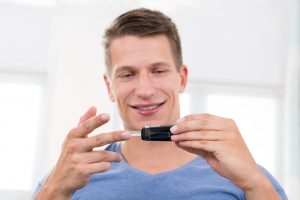Written by Taylor Woosley, Staff Writer. A comparison of glycemic control variables at 24-weeks of 200 mg resveratrol supplementation compared to baseline revealed a significant reduction in FPG (5.97%), HbA1c (5.60%), fasting insulin (8.59%), and HOMA-IR (13.93%) compared to placebo.
 The prevalence and incidence of Type 2 Diabetes mellitus (T2D), representing >90% of all cases of diabetes, are increasing rapidly throughout the world1. The World Health Organization reported that, globally, more than 425 million people are living with diabetes, and in the United States alone, more than 30 million Americans have diabetes2. Diabetes is a metabolic condition characterized by chronic hyperglycemia and results from an interplay of genetic and environmental factors3. Hyperglycemia can upregulate markers of chronic inflammation and contribute to increased reactive oxygen species (ROS) generation, which can lead to insulin resistance and impaired insulin secretion4.
The prevalence and incidence of Type 2 Diabetes mellitus (T2D), representing >90% of all cases of diabetes, are increasing rapidly throughout the world1. The World Health Organization reported that, globally, more than 425 million people are living with diabetes, and in the United States alone, more than 30 million Americans have diabetes2. Diabetes is a metabolic condition characterized by chronic hyperglycemia and results from an interplay of genetic and environmental factors3. Hyperglycemia can upregulate markers of chronic inflammation and contribute to increased reactive oxygen species (ROS) generation, which can lead to insulin resistance and impaired insulin secretion4.
Resveratrol, a natural polyphenolic antioxidant synthesized by several plant species, including grapes, peanuts, and blueberries, provides multiple metabolic benefits5. Numerous studies have demonstrated the beneficial effects of resveratrol in managing diabetes through various mechanisms such as preservation of beta-cells, improvement in the action of insulin and blood insulin concentrations, and improvement in insulin sensitivity6.
Mahjabeen et al. conducted a randomized, double-blind, placebo-controlled, parallel-group trial to explore the effectiveness of resveratrol in diabetic patients. Subject inclusion consisted of men and women aged 18-70 years, having a duration of diabetes ≥5 years, HbA1c 7-12% and on treatment with oral hypoglycemic agents (OHGA) for at least 1 year. Clinical history and information regarding age, gender, weight, height, disease history, previous laboratory tests, and continued treatments were obtained and recorded. 110 T2DM subjects were enrolled and divided into the resveratrol (n=55) and placebo (n=55) groups. The resveratrol group consumed a 200mg capsule of Pure Trans-resveratrol and placebo had a capsule of identical size and shape. Participants took a capsule daily with breakfast for 24 weeks along with their already prescribed OHGA. Compliance was monitored via phone calls at the interval of 2 weeks.
10 ml blood was collected to analyze FPG, fasting insulin, HbA1c, total cholesterol, high-density lipoprotein-cholesterol (HDL-C), triglycerides, low-density lipoprotein-cholesterol (LDL-C), TNF-α, IL-6, hs-CRP, MDA & miRNAs. Furthermore, urine samples were obtained for microalbuminuria both at commencement and at the end of the intervention. Primary outcome variables included were mean reduction in HbA1c, hsCRP, and malondialdehyde (MDA) after taking resveratrol compared with placebo at 24 weeks. Secondary outcomes consisted of mean change in fasting plasma glucose (FPG), fasting insulin, homeostatic model assessment of insulin resistance (HOMA-IR), lipid profile, micro-albuminuria, TNF-α, IL-6, and miRNAs in the resveratrol group compared to placebo at 24 weeks.
Comparison of baseline values between resveratrol and placebo groups for quantitative and categorical variables was done by using independent t-test/Mann-Whitney U test and chi-square tests respectively. Paired t-test was utilized to compare baseline and post-treatment data within resveratrol and placebo groups. 91 participants completed the study, comprising of 45 subjects in the resveratrol group and 46 in the placebo group. Significant findings of the 24-week trial are as follows:
- In the resveratrol group, a comparison of glycemic control variables at 24 weeks vs baseline revealed a significant reduction in FPG (5.97%), HbA1c (5.60%), fasting insulin (8.59%), and HOMA-IR (13.93%). Moreover, the reduction in microalbuminuria (15.65%) was also statistically significant at 24 weeks vs baseline.
- Inflammatory and oxidative stress variables including hs-CRP (11.94%), IL-6 (13.73%), TNF-α (12.70%) and MDA (8.72%) were significantly reduced (p < 0.05) after 24 weeks’ intervention as compared with baseline.
- Between-group comparison revealed that 24 weeks supplementation of resveratrol resulted in significant reduction in FPG (7.56%), HbA1c (6.31%), fasting insulin (9.96%), HOMA-IR (17.96%), hs-CRP (13.12%) TNF-α (13.67%), IL-6 (13.27%) and MDA (8.46%), microalbuminuria (13.48%) (p < 0.05 for all) compared to the placebo.
Results show that 24-week supplementation of resveratrol significantly decreased HOMA-IR and insulin levels in subjects with T2DM. Furthermore, resveratrol also reduced fasting glucose levels and HbA1c compared to placebo. Study limitations include the lack of assessing the compliance and level of absorption of resveratrol in subjects and the single-center nature of the study resulting in the generalizability of findings being potentially limited.
Source: Mahjabeen, Wajiha, Dilshad Ahmed Khan, and Shakil Ahmed Mirza. “Role of resveratrol supplementation in regulation of glucose hemostasis, inflammation and oxidative stress in patients with diabetes mellitus type 2: A randomized, placebo-controlled trial.” Complementary Therapies in Medicine 66 (2022): 102819.
© 2022 The Authors. Published by Elsevier Ltd. This is an open access article under the CC BY-NC-ND license (http://creativecommons.org/licenses/bync-nd/4.0/).
Click here to read the full text study.
Posted April 17, 2023.
References:
- Laakso M. Biomarkers for type 2 diabetes. Mol Metab. Sep 2019;27s(Suppl):S139-s146. doi:10.1016/j.molmet.2019.06.016
- Rachdaoui N. Insulin: The Friend and the Foe in the Development of Type 2 Diabetes Mellitus. Int J Mol Sci. Mar 5 2020;21(5)doi:10.3390/ijms21051770
- Ojo O. Dietary Intake and Type 2 Diabetes. Nutrients. Sep 11 2019;11(9)doi:10.3390/nu11092177
- Luc K, Schramm-Luc A, Guzik TJ, Mikolajczyk TP. Oxidative stress and inflammatory markers in prediabetes and diabetes. J Physiol Pharmacol. Dec 2019;70(6)doi:10.26402/jpp.2019.6.01
- Su M, Zhao W, Xu S, Weng J. Resveratrol in Treating Diabetes and Its Cardiovascular Complications: A Review of Its Mechanisms of Action. Antioxidants (Basel, Switzerland). May 30 2022;11(6)doi:10.3390/antiox11061085
- Jeyaraman MM, Al-Yousif NSH, Singh Mann A, et al. Resveratrol for adults with type 2 diabetes mellitus. Cochrane Database Syst Rev. Jan 17 2020;1(1):Cd011919. doi:10.1002/14651858.CD011919.pub2
